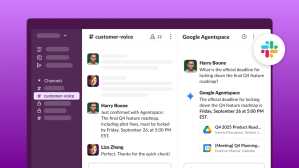2020 has rewritten the rules for digital transformation. What used to be a prolonged transformation is now an urgent imperative.
“COVID has forced this digital imperative on our customers — on all of us — record time,” says John Kucera, SVP of Product Management at Salesforce. “Companies have had to drastically automate and transform their processes, which has led to a massive digitization effort in a very short timeline.”

The problem is: businesses aren’t equipped to move at this breakneck pace. Whether they can adapt, and do it quickly, will define success.
To make rapid progress towards their digital transformation goals, they need to increase employee speed of work to keep customers happy. That requires smart automation.
When automation is done right, it accelerates productivity and empowers employees. It also frees up humans to do the work they’re uniquely meant to do by taking away “the tedious, repetitive steps that are soul sucking, and that people don’t enjoy doing,” says Kucera. “Automation gives people the bandwidth and breathing room to do more interesting, more inspiring, and more valuable work that moves the business forward such as building customer relationships or making hard decisions on what to do next.”
Automation gives people the bandwidth and breathing room to do more interesting, more inspiring, and more valuable work that moves the business forward such as building customer relationships or making hard decisions on what to do next.
John Kucera, SVP, Product Management
In a world that’s constantly changing and challenging to keep up with both personally and professionally, this is the super power that people — and businesses — need now.
A new approach to automation
At Salesforce, automation is in our DNA. Our journey began with a vision to be “A World-Class internet Company for Sales Force Automation.” Fast forward 20 years and automating business processes is still at the core of all the solutions we develop.
But today, the opportunity goes far beyond sales and requires a new approach.
To be effective in meeting the new digital imperative, automation needs to intelligently connect processes across the entire business: to scale customer experiences in service; to build and maintain customer relationships in sales; and to increase the speed of work and keep the business running in countless custom workflows across HR, IT, and finance.
This mandate is at the heart of Einstein Automate, a new solution that brings together some of the best Salesforce technologies — artificial intelligence (AI), data integration, and industry-specific workflows — in a single platform so business users can build automations for complex workflows in days, not months.
Seamless data integration empowers holistic automation
One of the biggest obstacles to successful automation has been the lack of data integration across organizations. The average enterprise has over 900 applications, but only a third of them are integrated, explains Stephen Hsu, Vice President of Product Management at MuleSoft.

“These businesses miss out on a highly relevant data set and have a very limited scope for any kind of automation they’re trying to build,” he says. “If you’re going to be serious about automation, you can’t just do automation in specific applications. All of your applications need to speak to each other.”
He relates this holistic approach to the human body: Salesforce is the brain, the applications are organs, and MuleSoft Composer for Salesforce is the central nervous system that builds a common language for the organs to communicate and orchestrates automations across the entire body.

“For the first time, instead of talking to different silos across the organization, your customer will have a unified experience and view you as a holistic company,” he says. “That’s powerful.”
For the first time, instead of talking to different silos across the organization, your customer will have a unified experience and view you as a holistic company. That’s powerful.
Stephen Hsu, Vice President of Product Management at MuleSoft
Automation for any business user
In the last decade, line of business leaders have had to rely on development teams to create a new custom solution every time they needed an employee or customer process automated. Like a hand-made antique car, these custom solutions are beautiful, but not practical, because they handicap a company’s ability to move fast and adapt with the times.
With our low-code approach, which underpins all of our solutions, business users who have never before been able to create their own automated processes can now have ‘super powers’ to quickly deliver what they need. They can use low-code “builders” to create a workable solution on day one, but also seamlessly integrate with reusable components and code professional developers create.
As of March 2020, our low-code approach has helped Salesforce customers automate more than 325 billion processes, an increase of 25% YoY. That’s 325 billion times someone has been able to automate a routine task like transferring data from an Excel grid into Salesforce, and focus their time towards innovation and customers.
The future of automation is human
Automation is most successful when it empowers humans to do their best work — work that is inspiring, strategic, and most valuable to their jobs, like building relationships and connecting with customers, and helping them feel valued.
The irony of it all is that we’re using incredible technology to help people be more human.
Brian Solis, Global Innovation Evangelist, Salesforce
Brian Solis, Salesforce’s Global Innovation Evangelist, explains that the best organizations in the world are going to move forward with automation and AI in order to realize breakthrough moments that streamline processes and free up resources to do exceptional work.

“We’re creating the new standard for experience,” says Solis. “The irony of it all is that we’re using incredible technology to help people be more human.”
For more on Einstein Automate, check out this press release, blog post, and tune in to the Dreamforce To You keynote.



















